Bootle (UK Parliament constituency)
Bootle is a constituency[n 1] which has been represented in the House of Commons of the UK Parliament, since 2015 by Peter Dowd of the Labour Party.[n 2]
| Bootle | |
|---|---|
| Borough constituency for the House of Commons | |
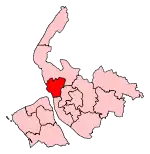 Boundary of Bootle in Merseyside | |
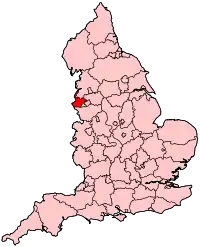 Location of Merseyside within England | |
| County | Merseyside |
| Population | 98,449 (2011 census)[1] |
| Electorate | 70,824 (December 2010)[2] |
| Major settlements | Bootle, Crosby, Waterloo, Seaforth, Litherland, Netherton, Orrell and Ford. |
| Current constituency | |
| Created | 1885 |
| Member of Parliament | Peter Dowd (Labour) |
| Seats | One |
| Created from | South West Lancashire |
History
From 1885 to 1935, the constituency returned Conservative MPs, with its most notable MP being Conservative Party leader Bonar Law from 1911 to 1918, when property qualifications for the vote were abolished. Bonar Law would later serve as UK Prime Minister from 1922 to 1923, though at that point he no longer represented Bootle in the House of Commons. James Burnie of the Liberal Party held the seat from 1922 to 1924, and the seat was briefly held by John Kinley from the Labour Party from 1929 to 1931 and became a Conservative–Labour marginal seat in the 1930s when the mainstream Labour party formed the National Government. The Labour Party has held it continuously since the 1945 general election; this period saw two decades of steep decline in the profitability of Liverpool Docks, manufacturing and shipbuilding, which employed many constituents. At the three general elections from 1997, Bootle was the safest seat for any party in the United Kingdom by percentage of majority.
In 1990, two by-elections were held in Bootle. The first followed the death of Allan Roberts on 21 February, and was held on 24 May. Jack Holmes, the candidate of the continuing Social Democratic Party (representing the faction of the party which did not merge with the Liberal Democrats) was beaten by Screaming Lord Sutch of the Official Monster Raving Loony Party, contributing to the end of the SDP. The victorious Labour candidate, Michael Carr unexpectedly died on 20 July 1990 after just 57 days in office.
The second by-election, held on 8 November 1990, was won by the Labour candidate, Joe Benton. Benton retained Bootle at the next four general elections with large majorities. At the 2005 general election, the seat was the safest seat by percentage of majority and had the highest winning share of the vote.[3] In June 2014, Benton announced that he would retire at the 2015 general election.
The 2015 result made the seat the fifth-safest of Labour's 232 seats by percentage of majority (with a winning vote share of 74.5% and a majority of 63.6%).[4][5]
Constituency profile
Though the seat has some small neighbourhoods with middle-to-high incomes, residents generally have some of the lowest UK incomes and there is a higher-than-average proportion of social housing.[6] The Bootle constituency has long been one of the safest seats in the United Kingdom and since 1945, has given a majority of votes cast to the Labour Party at each general election. Since 1964, the size of the majority (by vote share) has been in double digits; since 1992, it has been over 50%, peaking at 74.4% in the 1997 Blair landslide election. However, the Labour vote share was at its highest in 2017, when Peter Dowd received 84% of votes cast. Both the size of the majority and the share of the vote represent an unbeaten record for this constituency.
Boundaries
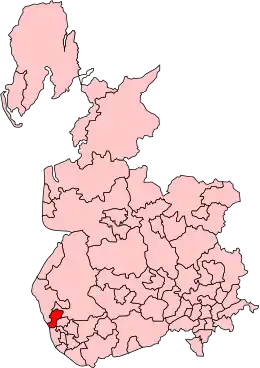
1885–1918: The Boroughs of Bootle-cum-Linacre and Liverpool, the parishes of Childwall, Fazakerley, Walton-on-the-Hill, and Wavertree, and parts of the parishes of Toxteth Park and West Derby.
1918–1950: The County Borough of Bootle.
1950–1955: The County Borough of Bootle, and the Urban District of Litherland.
1955–1974: The County Borough of Bootle.[7]
1974–1983: The County Borough of Bootle, and the Urban District of Litherland.[8]
1983–1997: The Metropolitan Borough of Sefton wards of Church, Derby, Ford, Linacre, Litherland, Netherton, Orrell, and St Oswald.
1997–2010: As above less Church ward.
2010–present: The Metropolitan Borough of Sefton wards of Church, Derby, Ford, Linacre, Litherland, Netherton and Orrell, St Oswald, and Victoria.
The constituency covers the southern part of the Metropolitan Borough of Sefton in Merseyside. This comprises Bootle itself plus other localities including Crosby, Waterloo, Seaforth, Litherland, Netherton, Orrell and Ford.
Boundary changes that came into force as a result of the 2010 general election being called saw the constituency grow to also include parts of the old Crosby constituency, with the electoral wards of Church and Victoria being added. Although these areas are more affluent than some parts of Bootle, it has not changed the seat from being anything other than a safe Labour one.
Members of Parliament
Elections
Elections in the 2010s
| Party | Candidate | Votes | % | ±% | |
|---|---|---|---|---|---|
| Labour | Peter Dowd | 39,066 | 79.4 | ―4.6 | |
| Conservative | Tarsilo Onuluk | 4,510 | 9.2 | ―2.8 | |
| Brexit Party | Kim Knight | 2,610 | 5.3 | New | |
| Liberal Democrats | Rebecca Hanson | 1,822 | 3.7 | +2.0 | |
| Green | Mike Carter | 1,166 | 2.4 | +1.0 | |
| Majority | 34,556 | 70.2 | ―1.8 | ||
| Turnout | 49,174 | 65.7 | ―3.5 | ||
| Labour hold | Swing | ―0.85 | |||
| Party | Candidate | Votes | % | ±% | |
|---|---|---|---|---|---|
| Labour | Peter Dowd | 42,259 | 84.0 | +9.5 | |
| Conservative | Charles Fifield | 6,059 | 12.0 | +3.9 | |
| Liberal Democrats | David Newman | 837 | 1.7 | ―0.5 | |
| Green | Alison Gibbon | 709 | 1.4 | ―1.9 | |
| Socialist Labour | Kim Bryan | 424 | 0.8 | New | |
| Majority | 36,200 | 72.0 | +8.4 | ||
| Turnout | 50,288 | 69.2 | +4.8 | ||
| Labour hold | Swing | +2.8 | |||
| Party | Candidate | Votes | % | ±% | |
|---|---|---|---|---|---|
| Labour | Peter Dowd | 33,619 | 74.5 | +8.0 | |
| UKIP | Paul Nuttall | 4,915 | 10.9 | +4.8 | |
| Conservative | Jade Marsden | 3,639 | 8.1 | ―0.8 | |
| Green | Lisa Tallis | 1,501 | 3.3 | New | |
| Liberal Democrats | David Newman | 978 | 2.2 | ―12.9 | |
| TUSC | Peter Glover | 500 | 1.1 | 0.0 | |
| Majority | 28,704 | 63.6 | +12.2 | ||
| Turnout | 45,152 | 64.4 | +6.6 | ||
| Labour hold | Swing | +1.6 | |||
| Party | Candidate | Votes | % | ±% | |
|---|---|---|---|---|---|
| Labour | Joe Benton | 27,426 | 66.5 | ―9.0 | |
| Liberal Democrats | James Murray | 6,245 | 15.1 | +3.5 | |
| Conservative | Sohail Qureshi | 3,678 | 8.9 | +2.8 | |
| UKIP | Paul Nuttall | 2,514 | 6.1 | +2.8 | |
| BNP | Charles Stewart | 942 | 2.3 | New | |
| TUSC | Peter Glover | 472 | 1.1 | New | |
| Majority | 21,181 | 51.4 | ―12.4 | ||
| Turnout | 41,227 | 57.8 | +7.0 | ||
| Labour hold | Swing | ―1.6 | |||
Elections in the 2000s
| Party | Candidate | Votes | % | ±% | |
|---|---|---|---|---|---|
| Labour | Joe Benton | 19,345 | 75.5 | ―2.1 | |
| Liberal Democrats | Chris Newby | 2,988 | 11.7 | +3.2 | |
| Conservative | Wafik Moustafa | 1,580 | 6.2 | ―1.8 | |
| UKIP | Paul Nuttall | 1,054 | 4.1 | New | |
| Socialist Alternative | Peter Glover | 655 | 2.6 | +0.2 | |
| Majority | 16,357 | 63.8 | ―5.3 | ||
| Turnout | 25,622 | 47.7 | ―2.1 | ||
| Labour hold | Swing | ―2.6 | |||
| Party | Candidate | Votes | % | ±% | |
|---|---|---|---|---|---|
| Labour | Joe Benton | 21,400 | 77.6 | ―5.3 | |
| Liberal Democrats | Jim Murray | 2,357 | 8.5 | +2.8 | |
| Conservative | Judith Symes | 2,194 | 8.0 | ―0.5 | |
| Socialist Labour | Dave Flynn | 971 | 3.5 | +2.4 | |
| Socialist Alliance | Peter Glover | 672 | 2.4 | New | |
| Majority | 19,043 | 69.1 | ―5.3 | ||
| Turnout | 27,594 | 49.8 | ―16.9 | ||
| Labour hold | Swing | ―5.3 | |||
Elections in the 1990s
| Party | Candidate | Votes | % | ±% | |
|---|---|---|---|---|---|
| Labour | Joe Benton | 31,668 | 82.9 | +8.3 | |
| Conservative | Rupert Matthews | 3,247 | 8.5 | ―7.5 | |
| Liberal Democrats | Kiron Reid | 2,191 | 5.7 | ―0.9 | |
| Referendum | James Elliot | 571 | 1.5 | New | |
| Socialist Labour | Peter Glover | 420 | 1.1 | New | |
| Natural Law | Simon Cohen | 126 | 0.3 | ―0.2 | |
| Majority | 28,421 | 74.4 | +15.8 | ||
| Turnout | 38,223 | 66.7 | ―5.8 | ||
| Labour hold | Swing | +6.0 | |||
| Party | Candidate | Votes | % | ±% | |
|---|---|---|---|---|---|
| Labour | Joe Benton | 37,464 | 74.6 | +7.7 | |
| Conservative | Christopher J. Varley | 8,022 | 16.0 | ―4.1 | |
| Liberal Democrats | John Cunningham | 3,301 | 6.6 | ―6.4 | |
| Liberal | Medina Hall | 1,174 | 2.3 | New | |
| Natural Law | Thomas Haynes | 264 | 0.5 | New | |
| Majority | 29,442 | 58.6 | +11.8 | ||
| Turnout | 50,225 | 72.5 | ―0.4 | ||
| Labour hold | Swing | +5.9 | |||
| Party | Candidate | Votes | % | ±% | |
|---|---|---|---|---|---|
| Labour | Joe Benton | 22,052 | 78.2 | +2.8 | |
| Conservative | James Clappison | 2,587 | 9.2 | +0.1 | |
| Liberal Democrats | John Cunningham | 2,216 | 7.9 | ―1.0 | |
| Green | Sean Brady | 557 | 2.0 | ―1.6 | |
| Monster Raving Loony | Screaming Lord Sutch | 310 | 1.1 | ―0.1 | |
| Liberal | Kevin White | 291 | 1.0 | ―0.3 | |
| Christian Alliance | David Black | 132 | 0.5 | New | |
| Majority | 19,465 | 69.0 | +2.7 | ||
| Turnout | 28,145 | 39.7 | ―10.9 | ||
| Labour hold | Swing | +1.5 | |||
| Party | Candidate | Votes | % | ±% | |
|---|---|---|---|---|---|
| Labour | Michael Carr | 26,737 | 75.4 | +8.5 | |
| Conservative | James Clappison | 3,220 | 9.1 | ―11.0 | |
| Liberal Democrats | John Cunningham | 3,179 | 8.9 | ―4.1 | |
| Green | Sean Brady | 1,269 | 3.6 | New | |
| Liberal | Kevin White | 474 | 1.3 | New | |
| Monster Raving Loony | Screaming Lord Sutch | 418 | 1.2 | New | |
| SDP | Jack Holmes | 155 | 0.4 | New | |
| Independent | T. J. Schofield | 27 | 0.1 | New | |
| Majority | 23,517 | 66.3 | +19.5 | ||
| Turnout | 35,477 | 50.6 | ―22.3 | ||
| Labour hold | Swing | +9.8 | |||
Elections in the 1980s
| Party | Candidate | Votes | % | ±% | |
|---|---|---|---|---|---|
| Labour | Allan Roberts | 34,975 | 66.9 | +13.9 | |
| Conservative | Peter Papworth | 10,498 | 20.1 | −3.5 | |
| SDP | Paul Denham | 6,820 | 13.0 | −10.4 | |
| Majority | 24,477 | 46.8 | +17.4 | ||
| Turnout | 52,293 | 72.9 | +4.6 | ||
| Labour hold | Swing | +8.7 | |||
| Party | Candidate | Votes | % | ±% | |
|---|---|---|---|---|---|
| Labour | Allan Roberts | 27,282 | 53.0 | −8.0 | |
| Conservative | Ronald Watson | 12,143 | 23.6 | −3.0 | |
| SDP | John Wall | 12,068 | 23.4 | +13.1 | |
| Majority | 15,139 | 29.4 | −5.0 | ||
| Turnout | 51,493 | 68.3 | −2.1 | ||
| Labour hold | Swing | ||||
Elections in the 1970s
| Party | Candidate | Votes | % | ±% | |
|---|---|---|---|---|---|
| Labour | Allan Roberts | 26,900 | 61.0 | −3.0 | |
| Conservative | Ronald Watson | 11,741 | 26.6 | +1.7 | |
| Liberal | D.L. Mahon | 4,531 | 10.3 | +0.4 | |
| Independent Liberal | H.I. Fjortoft | 911 | 2.1 | New | |
| Majority | 15,159 | 34.4 | −4.7 | ||
| Turnout | 44,083 | 70.4 | +3.2 | ||
| Labour hold | Swing | -2.4 | |||
| Party | Candidate | Votes | % | ±% | |
|---|---|---|---|---|---|
| Labour | Simon Mahon | 27,633 | 64.0 | +5.4 | |
| Conservative | J F Borrows | 10,743 | 24.9 | −1.7 | |
| Liberal | H.I. Fjortoft | 4,266 | 9.9 | -3.6 | |
| Communist | R. Morris | 512 | 1.2 | −0.1 | |
| Majority | 16,890 | 39.1 | +7.1 | ||
| Turnout | 43,158 | 67.2 | −6.1 | ||
| Labour hold | Swing | +3.6 | |||
| Party | Candidate | Votes | % | ±% | |
|---|---|---|---|---|---|
| Labour | Simon Mahon | 27,301 | 58.6 | −5.0 | |
| Conservative | J.F. Borrows | 12,366 | 26.6 | −9.8 | |
| Liberal | H.I. Fjortoft | 6,258 | 13.5 | New | |
| Communist | R. Morris | 586 | 1.3 | New | |
| Majority | 14,935 | 32.0 | +4.8 | ||
| Turnout | 46,511 | 73.3 | +8.1 | ||
| Labour hold | Swing | +2.4 | |||
| Party | Candidate | Votes | % | ±% | |
|---|---|---|---|---|---|
| Labour | Simon Mahon | 20,101 | 63.6 | +3.2 | |
| Conservative | G. Halliwell | 11,496 | 36.4 | +2.8 | |
| Majority | 8,614 | 27.2 | +0.4 | ||
| Turnout | 31,633 | 65.2 | −3.0 | ||
| Labour hold | Swing | +0.2 | |||
Elections in the 1960s
| Party | Candidate | Votes | % | ±% | |
|---|---|---|---|---|---|
| Labour | Simon Mahon | 19,412 | 60.4 | −1.6 | |
| Conservative | George Halliwell | 10,813 | 33.6 | −4.4 | |
| Independent Labour | William Grant | 1,931 | 6.0 | New | |
| Majority | 8,599 | 26.8 | +2.8 | ||
| Turnout | 32,156 | 68.2 | −2.7 | ||
| Labour hold | Swing | +1.4 | |||
| Party | Candidate | Votes | % | ±% | |
|---|---|---|---|---|---|
| Labour | Simon Mahon | 21,677 | 62.0 | +8.3 | |
| Conservative | George Halliwell | 13,285 | 38.0 | −8.3 | |
| Majority | 8,392 | 24.0 | +16.6 | ||
| Turnout | 34,962 | 70.9 | −7.4 | ||
| Labour hold | Swing | +8.3 | |||
Elections in the 1950s
| Party | Candidate | Votes | % | ±% | |
|---|---|---|---|---|---|
| Labour | Simon Mahon | 21,294 | 53.7 | +1.7 | |
| Conservative | Harry O Cullen | 18,379 | 46.3 | −1.7 | |
| Majority | 2,915 | 7.4 | +3.4 | ||
| Turnout | 39,673 | 78.3 | +2.6 | ||
| Labour hold | Swing | +1.7 | |||
| Party | Candidate | Votes | % | ±% | |
|---|---|---|---|---|---|
| Labour | Simon Mahon | 19,020 | 52.0 | −0.7 | |
| Conservative | Herbert W Jones | 17,582 | 48.0 | +3.3 | |
| Majority | 1,438 | 4.0 | -4.0 | ||
| Turnout | 36,602 | 75.7 | −5.5 | ||
| Labour hold | Swing | −2.0 | |||
| Party | Candidate | Votes | % | ±% | |
|---|---|---|---|---|---|
| Labour | John Kinley | 26,597 | 52.7 | −0.1 | |
| Conservative | A Owen Hughes | 22,535 | 44.7 | −0.2 | |
| Anti-Partition | Harry McHugh | 1,340 | 2.7 | +0.4 | |
| Majority | 4,062 | 8.0 | +0.1 | ||
| Turnout | 50,472 | 81.2 | −0.9 | ||
| Labour hold | Swing | +0.2 | |||
| Party | Candidate | Votes | % | ±% | |
|---|---|---|---|---|---|
| Labour | John Kinley | 25,472 | 52.8 | −5.8 | |
| Conservative | W. Hill | 21,673 | 44.9 | +3.5 | |
| Anti-Partition | Bernard McGinnity | 1,029 | 2.3 | New | |
| Majority | 3,799 | 7.9 | -9.3 | ||
| Turnout | 48,174 | 82.1 | +12.4 | ||
| Labour hold | Swing | −4.7 | |||
Elections in the 1940s
| Party | Candidate | Votes | % | ±% | |
|---|---|---|---|---|---|
| Labour | John Kinley | 15,823 | 58.6 | +19.8 | |
| Conservative | Eric Errington | 11,180 | 41.4 | −7.2 | |
| Majority | 4,643 | 17.2 | N/A | ||
| Turnout | 27,003 | 69.7 | −1.6 | ||
| Labour gain from Conservative | Swing | ||||
Elections in the 1930s
| Party | Candidate | Votes | % | ±% | |
|---|---|---|---|---|---|
| Conservative | Eric Errington | 16,653 | 48.6 | −13.3 | |
| Labour | John Kinley | 13,285 | 38.8 | +0.7 | |
| Liberal | James Burnie | 4,319 | 12.6 | New | |
| Majority | 3,368 | 9.8 | −14.0 | ||
| Turnout | 34,257 | 71.3 | −7.6 | ||
| Conservative hold | Swing | ||||
| Party | Candidate | Votes | % | ±% | |
|---|---|---|---|---|---|
| Conservative | Chichester Crookshank | 22,966 | 61.9 | +21.2 | |
| Labour | John Kinley | 14,160 | 38.1 | −5.5 | |
| Majority | 8,806 | 23.8 | N/A | ||
| Turnout | 37,126 | 78.9 | +1.0 | ||
| Conservative gain from Labour | Swing | ||||
Elections in the 1920s
| Party | Candidate | Votes | % | ±% | |
|---|---|---|---|---|---|
| Labour | John Kinley | 15,294 | 43.6 | +8.9 | |
| Unionist | Vivian Henderson | 14,263 | 40.7 | −4.8 | |
| Liberal | Ernest Eric Edwards | 5,523 | 15.7 | −4.1 | |
| Majority | 1,031 | 2.9 | N/A | ||
| Turnout | 35,080 | 77.9 | +0.9 | ||
| Labour gain from Unionist | Swing | +6.8 | |||
| Party | Candidate | Votes | % | ±% | |
|---|---|---|---|---|---|
| Unionist | Vivian Henderson | 12,361 | 45.5 | +3.4 | |
| Labour | John Kinley | 9,427 | 34.7 | +20.9 | |
| Liberal | James Burnie | 5,386 | 19.8 | −24.3 | |
| Majority | 2,934 | 10.8 | N/A | ||
| Turnout | 27,174 | 77.0 | +8.9 | ||
| Unionist gain from Liberal | Swing | ||||
| Party | Candidate | Votes | % | ±% | |
|---|---|---|---|---|---|
| Liberal | James Burnie | 10,444 | 44.1 | −12.2 | |
| Unionist | Vivian Henderson | 9,991 | 42.1 | +0.2 | |
| Labour | John Kinley | 3,272 | 13.8 | New | |
| Majority | 453 | 2.0 | −12.4 | ||
| Turnout | 23,707 | 68.1 | −3.0 | ||
| Liberal hold | Swing | -6.2 | |||
| Party | Candidate | Votes | % | ±% | |
|---|---|---|---|---|---|
| Liberal | James Burnie | 13,276 | 56.3 | New | |
| Unionist | Alexander Bicket | 9,867 | 41.9 | -21.1 | |
| Independent | J E Burke | 425 | 1.8 | New | |
| Majority | 3,409 | 14.4 | N/A | ||
| Turnout | 23,568 | 71.1 | +12.6 | ||
| Liberal gain from Unionist | Swing | ||||
Elections in the 1910s
| Party | Candidate | Votes | % | ±% | |
|---|---|---|---|---|---|
| C | Unionist | Thomas Royden | 12,312 | 63.0 | N/A |
| Sailors' Union | Edmund Cathery | 7,235 | 37.0 | New | |
| Majority | 5,077 | 26.0 | N/A | ||
| Turnout | 19,547 | 58.5 | N/A | ||
| Unionist hold | Swing | ||||
| C indicates candidate endorsed by the coalition government. | |||||
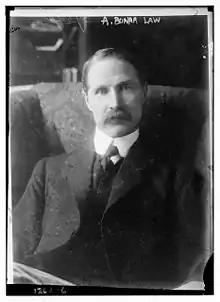
General Election 1914–15:
Another General Election was required to take place before the end of 1915. The political parties had been making preparations for an election to take place and by July 1914, the following candidates had been selected;
- Unionist: Bonar Law
- Liberal:
| Party | Candidate | Votes | % | ±% | |
|---|---|---|---|---|---|
| Conservative | Bonar Law | 9,976 | 56.2 | N/A | |
| Liberal | Max Muspratt | 7,782 | 43.8 | New | |
| Majority | 2,194 | 12.4 | N/A | ||
| Turnout | 17,758 | 69.7 | N/A | ||
| Conservative hold | Swing | N/A | |||
| Party | Candidate | Votes | % | ±% | |
|---|---|---|---|---|---|
| Conservative | Thomas Sandys | Unopposed | |||
| Conservative hold | |||||
| Party | Candidate | Votes | % | ±% | |
|---|---|---|---|---|---|
| Conservative | Thomas Sandys | 9,954 | 52.9 | +1.8 | |
| Liberal | William Permewan | 8,869 | 47.1 | -1.8 | |
| Majority | 1,085 | 5.8 | +3.6 | ||
| Turnout | 18,823 | 78.7 | +4.9 | ||
| Conservative hold | Swing | ||||
Elections in the 1900s
| Party | Candidate | Votes | % | ±% | |
|---|---|---|---|---|---|
| Conservative | Thomas Sandys | 7,821 | 51.1 | N/A | |
| Liberal | Alfred Patten Thomas | 7,481 | 48.9 | New | |
| Majority | 340 | 2.2 | N/A | ||
| Turnout | 15,302 | 73.8 | N/A | ||
| Registered electors | 20,721 | ||||
| Conservative hold | Swing | N/A | |||
| Party | Candidate | Votes | % | ±% | |
|---|---|---|---|---|---|
| Conservative | Thomas Sandys | Unopposed | |||
| Conservative hold | |||||
Elections in the 1890s
| Party | Candidate | Votes | % | ±% | |
|---|---|---|---|---|---|
| Conservative | Thomas Sandys | Unopposed | |||
| Conservative hold | |||||
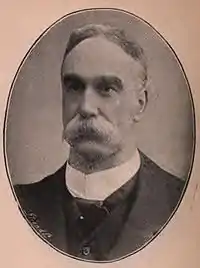
| Party | Candidate | Votes | % | ±% | |
|---|---|---|---|---|---|
| Conservative | Thomas Sandys | 6,532 | 59.4 | N/A | |
| Liberal | Alexander McDougall | 4,460 | 40.6 | New | |
| Majority | 2,072 | 18.8 | N/A | ||
| Turnout | 10,992 | 69.7 | N/A | ||
| Registered electors | 15,772 | ||||
| Conservative hold | Swing | N/A | |||
Elections in the 1880s
| Party | Candidate | Votes | % | ±% | |
|---|---|---|---|---|---|
| Conservative | Thomas Sandys | Unopposed | |||
| Conservative hold | |||||
| Party | Candidate | Votes | % | ±% | |
|---|---|---|---|---|---|
| Conservative | Thomas Sandys | 6,715 | 63.1 | ||
| Liberal | Samuel Whitbread | 3,933 | 36.9 | ||
| Majority | 2,782 | 26.2 | |||
| Turnout | 10,648 | 72.6 | |||
| Registered electors | 14,663 | ||||
| Conservative win (new seat) | |||||
Notes
- A borough constituency (for the purposes of election expenses and type of returning officer)
- As with all constituencies, the constituency elects one Member of Parliament (MP) by the first past the post system of election at least every five years.
References
- "Bootle: Usual Resident Population, 2011". Neighbourhood Statistics. Office for National Statistics. Archived from the original on 4 March 2016. Retrieved 31 January 2015.
- "Electorate Figures – Boundary Commission for England". 2011 Electorate Figures. Boundary Commission for England. 4 March 2011. Archived from the original on 6 November 2010. Retrieved 13 March 2011.
- report, p14
- "Majority by Constituency | General Elections Online". Archived from the original on 23 May 2015.
- "Labour Members of Parliament 2015". UK Political.info. Archived from the original on 29 September 2018.
- "Local statistics - Office for National Statistics". neighbourhood.statistics.gov.uk. Archived from the original on 11 February 2003. Retrieved 19 April 2018.
- "The Parliamentary Constituencies (Liverpool and South-West Lancashire) Order 1955. SI 1955/15". Statutory Instruments 1955. Part II. London: Her Majesty's Stationery Office. 1956. pp. 2144–2147.
- "The Parliamentary Constituencies (England) Order 1970", legislation.gov.uk, The National Archives, SI 1970/1674, retrieved 23 July 2023
- Leigh Rayment's Historical List of MPs – Constituencies beginning with "B" (part 4)
- "Bootle Parliamentary constituency". BBC News. BBC. Retrieved 25 November 2019.
- "General Election 2017: who is standing for election". Liverpool Echo. 11 May 2017.
- "Election Data 2015". Electoral Calculus. Archived from the original on 17 October 2015. Retrieved 17 October 2015.
- "Bootle". BBC News. Retrieved 10 May 2015.
- "Election Data 2010". Electoral Calculus. Archived from the original on 26 July 2013. Retrieved 17 October 2015.
- "Election Data 2005". Electoral Calculus. Archived from the original on 15 October 2011. Retrieved 18 October 2015.
- "Election Data 2001". Electoral Calculus. Archived from the original on 15 October 2011. Retrieved 18 October 2015.
- "Election Data 1997". Electoral Calculus. Archived from the original on 15 October 2011. Retrieved 18 October 2015.
- "Election Data 1992". Electoral Calculus. Archived from the original on 15 October 2011. Retrieved 18 October 2015.
- "UK General Election results April 1992". Richard Kimber's Political Science Resources. Politics Resources. 9 April 1992. Archived from the original on 11 August 2011. Retrieved 6 December 2010.
- The changes and swing are calculated relative to the 1987 general election, not to either of the 1990 by-elections.
- "Election Data 1987". Electoral Calculus. Archived from the original on 15 October 2011. Retrieved 18 October 2015.
- "Election Data 1983". Electoral Calculus. Archived from the original on 15 October 2011. Retrieved 18 October 2015.
- Craig, FWS, ed. (1974). British Parliamentary Election Results: 1885-1918. London: Macmillan Press. ISBN 9781349022984.
Sources
- Election results, 1950 – 2005 Archived 5 May 2004 at the Wayback Machine
- F. W. S. Craig, British Parliamentary Election Results 1885 – 1918
- F. W. S. Craig, British Parliamentary Election Results 1918 – 1949
External links
- nomis Constituency Profile for Bootle — presenting data from the ONS annual population survey and other official statistics.